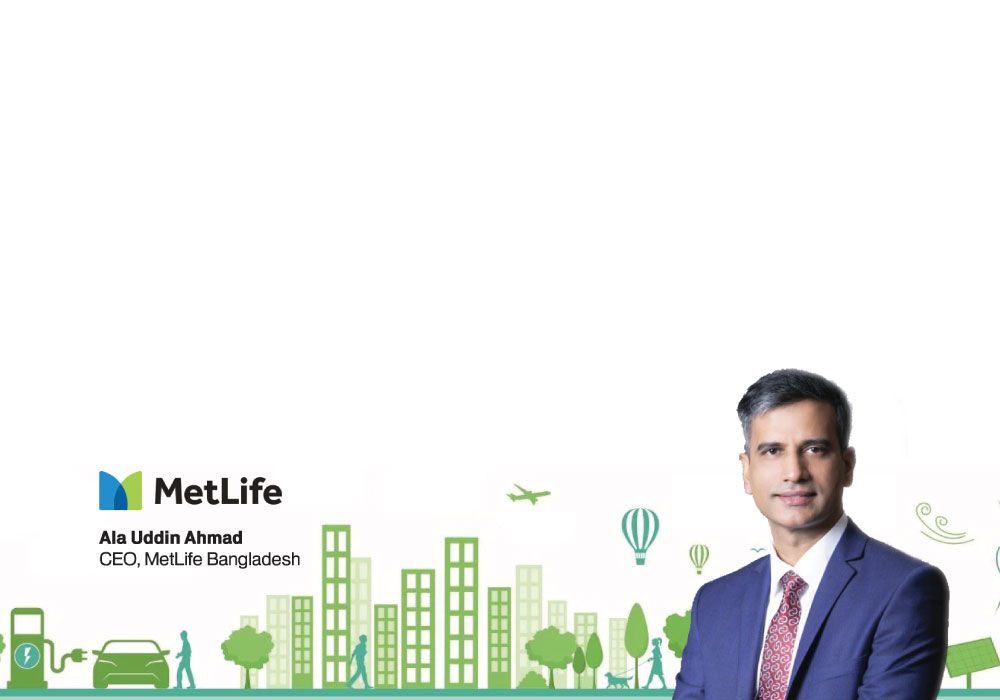- info@ficci.org.bd
- |
- +880248814801, +880248814802
- Contact Us
- |
- Become a Member
- |
- |
- |
- |
- |

MetLife has been a trusted partner in Bangladesh's growth since 1952, evolving into one of the country's largest institutional investors. Over the years, we have strategically managed investments that drive sustainable development and contribute to economic resilience.
From our experience, we see that despite the significant role in fueling economic growth, the insurance industry's impact often goes unrecognized. It's time to shift the perception and showcase how the insurance sector can be a powerhouse in building a stronger investment landscape for the country.
Let's start with what a "strong investment landscape" is.
A strong investment landscape is an economic environment characterized by stability, transparency, and a broad range of investment opportunities that encourage capital flows from both domestic and international investors. It is defined by a combination of economic stability, regulatory clarity, diverse investment avenues, and a well-developed financial infrastructure that supports efficient capital allocation. Such a landscape fosters investor confidence, reduces risk, and promotes sustainable economic growth by providing businesses and individuals with the right tools to invest confidently. Ultimately, it acts as a catalyst for innovation, job creation, and national development, making the country a more attractive destination for long-term investments all of which, right at this moment, is vital for Bangladesh's economic sustainability as one of the fastest-growing markets in the world.

The role of the insurance sector in driving investments
Insurance companies play a unique role in fueling the investment landscape by transforming collected premiums into active investments across various sectors. When a customer pays an insurance premium-be it for health, life, or property-the money doesn't simply sit idle. Instead, insurance companies allocate these funds into a variety of asset classes. This process helps in diversifying the economic input, leading to growth in multiple sectors simultaneously.
For instance, a significant portion of the insurance premium may be invested in government securities, helping to fund public projects such as roads, bridges, and schools. Alternatively, part of the premium might go into corporate bonds, providing crucial capital for companies to expand their operations or invest in research and development. As a result, the impact of insurance premiums extends beyond providing policyholders with coverage; it strengthens the financial backbone of the country, promoting development and stability.
Moreover, because insurance companies deal with large pools of capital, they are often able to take on long-term investments that other financial institutions might shy away from. This characteristic is especially crucial for developing countries like Bangladesh, where long-term infrastructure projects are key to sustained growth.
Insurance sector needs diverse investment opportunities
For insurance companies, having access to a diverse set of investment opportunities is essential. This diversity ensures that the risk of any one investment underperforming does not jeopardize the entire portfolio. When insurers can spread their investments across different asset classes, they build a more resilient portfolio that can withstand economic shocks, such as downturns in specific sectors.
In Bangladesh, expanding the range of investment options available to insurance firms could involve encouraging more private-public partnerships, opening up new sectors for investment, and improving access to international markets. For example, insurance companies could invest in energy projects, technology ventures, or sustainable development initiatives that align with global trends and emerging needs. Such diversity not only stabilizes the insurance sector but also fuels broader economic growth by supporting a wide range of industries.
Moreover, diversity in investment helps insurance companies achieve better returns, which they can then pass on to policyholders in the form of bonuses or lower premiums. This creates a win-win scenario for both the industry and its customers, enhancing the overall appeal of insurance products and contributing to a healthier financial ecosystem.

Attracting foreign investors
A well-developed internal investment landscape sends a powerful signal to international investors: it suggests that the country is stable, transparent, and capable of generating competitive returns. For Bangla- desh, the growth of the insurance sector as a key investor in the nation- al economy can serve as a magnet for foreign direct investment (FDI). When foreign investors see that local entities, such as insurance firms, are heavily investing in long-term projects, they are more likely to view the country as a safe and attractive destination for their own capital.
In turn, this influx of international funds can accelerate the development of high-priority sectors, such as infrastructure, technology, and renewable energy. It also promotes knowledge transfer, innovation, and the integration of Bangladesh into global value chains. For instance, if international investors see insurance companies supporting renewable energy projects, they may be more inclined to invest in related sectors, amplifying the impact of local investments and contributing to a more dynamic economy.
MetLife's experience in investments
MetLife is one of the largest investors in Bangladesh, with over 18,700 crore Taka in total investments. While the majori- ty of the investment is in government bonds, MetLife has also pioneered investment in corporate bonds to showcase the immense potential of developing diverse and new investment sectors. Let's share two recent case studies:
MetLife Bangladesh invested BDT 257.5 Crore in the country's first-ever internationally certified sustainability bond issued by Runner Automobiles Limited.
Runner Automobiles issued the sustainability bond to facilitate access to credit for customers who wish to buy lower-emitting three-wheelers, including electric-powered three-wheelers, and to support the construction of a 4MW rooftop solar plant for its manufacturing facility. This initiative granted an opportunity for around 7,000 drivers to become owners of three-wheelers, leading to income-generating prospects for drivers and downstream vehicle maintenance companies.
MetLife Bangladesh also invested BDT 472 crore in a bond issued by PRAN Agro Limited (PAL), a sister concern of PRAN-RFL Group. The investment helped PRAN Agro finance its infrastructure expansion plans.
To continue providing sustainable financing to local corporates, we also invested BDT 116 Crore in the Zero Coupon Bond issued by Delta Brac Housing Finance Corporation Ltd. (DBH).
These examples highlight the need for more structured investment channels and the benefits of insurance companies participating as key stakeholders in the country's economic development. By supporting established corporates, the insurance sector is directly contributing to job creation, export diversification, and overall economic resilience.

The right time to take the right actions:
To further enhance its contribution to Bangladesh's investment landscape, the insurance sector needs to pursue several strategic initiatives:
By taking these steps, Bangladesh's insurance sector can play a pivotal role in shaping a more dynamic and resilient investment landscape, paving the way for sustainable national development and stronger global integration.





